Handbooks
In line with its mission and activities, ArmEnic regularly conducts studies, the results of which are presented in the corresponding handbooks.
In line with its mission and activities, ArmEnic regularly conducts studies, the results of which are presented in the corresponding handbooks.
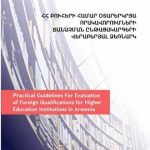
Practical Guidelines for Evaluation of Foreign Qualifications for Higher Education Institutions in Armenia
The manual “Practical Guidelines for Evaluation of Foreign Qualifications for Higher Education Institutions in Armenia” has been developed in the framework of the Council of Europe’s (CoE) “Enhancing National Mechanisms of Recognition of Refugees’ Qualifications/NATREQ-RQ” grant project, which aims to promote cooperation and mobility in education through the recognition of qualifications.
The manual is a comprehensive and systematic practical guide describing procedures and tools of the recognition.
This manual is for the staff of the Republic of Armenia’s RA higher education institutions responsible for the evaluation of foreign qualifications as well as admissions. The aim of the manual is to promote fair and transparent recognition of qualifications in line with the Lisbon Recognition Convention, with a specific focus on the recognition of refugees’ qualifications.
The publication is available here.
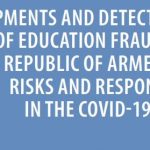
Developments and Detection of Education Fraud in the Republic of Armenia: Risks and Responses in the COVID-19 Age
Nowadays more than ever, the issues of academic integrity and fraud have moved to the forefront of education policy agendas. International organisations, national governments, as well as civil society and professional organisations join their efforts to tackle the growing problem of education fraud, which seriously threatens core academic values.
When trying to estimate the scope of academic integrity and fraud it is important to understand the context in which it occurs. Secondly, rapid technological developments have strongly influenced the provision of education producing some lasting changes.
The objective of this publication is to reach a wider audience of all stakeholders and to raise their awareness on the current issues of academic integrity and fraud and their impact on the Armenian education system. Moreover, the study examines the development and detection of the various forms of education fraud and corruption practices taking place during the COVID-19 pandemic and makes recommendations in the context of identified ethical principles for education.
The publication is available here.
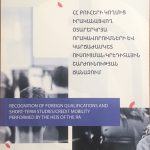 Research on the Recognition of Foreign Qualifications and Short-term Studies/Credit Mobility Performed by the Higher Education Institutions (HEIs) of the Republic of Armenia (RA)
Research on the Recognition of Foreign Qualifications and Short-term Studies/Credit Mobility Performed by the Higher Education Institutions (HEIs) of the Republic of Armenia (RA)
In the Yerevan Communiqué adopted at the European Higher Education Area (EHEA) Ministerial Conference held in Yerevan in 2015 the EHEA Ministers confirmed the need to revise the national legislations of the EHEA member states to ensure their full compliance with the Lisbon Recognition Convention (LRC). Moreover, the EHEA Ministers agreed that the process should be carried out by LRC Committee in cooperation with the ENIC-NARIC Networks.
ArmEnic, being a member of the ENIC-NARIC Networks and participating in the preparation of the Monitoring Report on the LRC implementation, conducted this study, aimed at enhancing the recognition procedures of foreign qualifications and short-term studies/credit mobility performed by the RA HEIs. Furthermore, based on the results of the study, a handbook was published, where ArmEnic presented the conclusions and recommendations for improving the institutional recognition in the RA and making it in line with the LRC.
For the purpose of the study, a questionnaire was developed, which was sent electronically to 47 accredited state and private higher education institutions of the RA. Responses were received from 19 universities (13 state HEIs and 6 accredited private HEIs). The analysis of the responses is presented in the corresponding sections of the handbook.
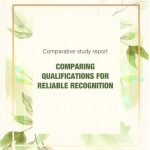 QUATREC-Comparing Qualifications for Reliable Recognition
QUATREC-Comparing Qualifications for Reliable Recognition
The Erasmus+ NARIC project “Comparing qualifications for reliable recognition” (QUATREC) (January 2018 – February 2020) aims to encourage the use of learning outcomes in credential evaluation for improved recognition in line with existing and emerging qualifications frameworks. Further aims of this comparative study are to promote examples of good practice and provide recommendations for a methodology on how learning outcomes and qualifications frameworks may be used during the recognition of qualifications; thus, fostering easier and simplified recognition procedures leading towards automatic recognition in future.
The QUATREC project partners are the ENIC/NARIC offices from Latvia (Academic Information Centre – project coordinator), Bulgaria (National Centre for Information and Documentation, NACID), Estonia (Archimedes Foundation), and the United Kingdom (UK NARIC) and Armenian ENIC office (National Information Center for Academic Recognition and Mobility, ARMENIC).
Three qualifications and their learning outcomes awarded in the project partner countries – Armenia, Bulgaria, Estonia, Latvia and the United Kingdom – were selected for horizontal comparison to investigate whether the learning outcomes of the same level qualifications have no substantial differences and the qualifications are comparable.
The report may serve as a source of reference for ENIC/NARIC offices, credential evaluators, HEIs, students, and policy makers to raise awareness of learning outcomes and NQFs in recognition. Thus, the QUATREC project promotes a common understanding of the use of the learning outcomes and qualifications frameworks in recognition, improves fair recognition of qualifications, as well as raises awareness of prerequisites for using learning outcomes and qualifications frameworks in the recognition of qualifications.
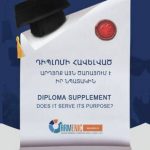 DIPLOMA SUPPLEMENT: DOES IT SERVE ITS PURPOSE?
DIPLOMA SUPPLEMENT: DOES IT SERVE ITS PURPOSE?
In 2019 ArmEnic initiated the preparation and publication of the handbook on “Diploma Supplement: Does It Serve Its Purpose?”.
The objective of the study conducted by ArmEnic is to examine whether the DS awarded by the accredited state and private higher education institutions (HEI) of the Republic of Armenia (RA) serves its purpose. The aim of the handbook is to raise awareness about the purpose and application of the DS, as well as the implementation of its revised version in the HEIs of the RA.
The following works have been performed during the study:
The handbook is for the state bodies of the RA, HEIs, students, graduates, employers, etc.
The handbook and the results of the study were presented during the event organized by ArmEnic. The deputy minister of MoESCS, the representatives of HEIs, the representative of the Republican Union of Employers of Armenia and students were present at the event.
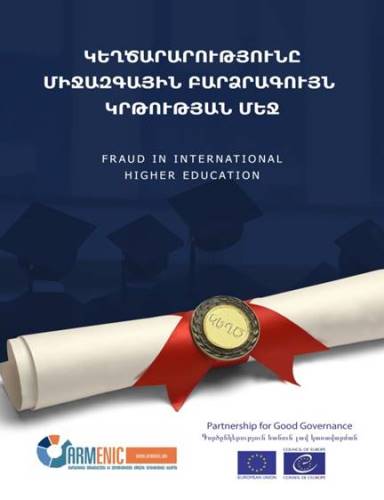
Fraud in International Higher Education
In 2017 ARMENIC initiated the preparation and publication of the handbook on “Fraud in International Higher Education”. The handbook is the result of the research conducted by ARMENIC using the funds of the micro-project grant launched in the framework of the European Union and Council of Europe project “Strengthening Integrity and Combating Corruption in Higher Education in Armenia”.
The objective of the handbook is to raise the awareness of fraud in higher education among higher education institutions, employers, applicants, and students as well as enhance their capacity to detect and combat this phenomenon.
During the research the phenomenon of fraud in international, transnational, cross-border higher education was studied by defining the most widely spread forms of fraud. Definitions and ways for detection of main types of fraud were presented. Case studies were included during the description of the main issues addressed. Moreover, the current situation in Armenia related to the growing problem of fraud in higher education was studied, and recommendations and guidelines for the detection of fraud as well as for fighting against this phenomenon were also presented.
The Handbook and the results of the research were presented during the following events:
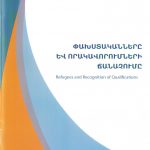 Manual for Recognition of Refugees’ Qualifications
Manual for Recognition of Refugees’ Qualifications
The Manual for Recognition of Refugees’ Qualifications has been developed by the National Information Center for Academic Recognition and Mobility in the framework of the EU co-funded project “Refugees and Recognition. A Toolkit for Recognition of Refugees and Displaced persons Higher Education”.
The goal of the program is to support ENIC-NARIC network members, HEIs and credential evaluators of other organizations responsible for recognition to recognize refugees’ qualifications even when the documents submitted by them are incomplete or missing altogether. More detailed information about the program can be found at https://www.nokut.no/om-nokut/internasjonalt-samarbeid/erasmus-projekter/refugees-and-recognition/ . The partner organizations of the project are ENIC-NARIC centers in Norway (NOKUT), UK (UK NARIC), France (CIEP), Netherlands (NUFFIC), Italy (CIMEA) and Armenia (ArmENIC), the project is coordinated by NOKUT.
The documents presented in the manual – the summary of the Syrian higher education system, the samples of documents for the issuance of refugees’ qualification passports – were developed, translated, and adapted based on the relevant documents created by the member organizations of the program.
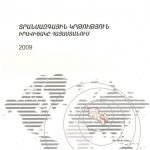 Transnational Education. Situation in Armenia
Transnational Education. Situation in Armenia
The transnational education is not a temporary phenomenon and will continue to grow in the future retaining its significance. This research conducted by the National Information Center for Academic Recognition and Mobility in 2008 is the first attempt to study the transnational education in Armenia. The study was conducted with some restrictions, and the results show that it is necessary to continue it including all institutions providing transnational education.
The research is for all specialists involved in the field of education, students, lecturers as well as for all those interested in transnational education.

Developments and Deletion of Education Fraud in the Republic of Armenia: Risks and Responses in the COVID-19 Age
Nowadays, more than ever, the issues of academic integrity and fraud have moved to the forefront of education policy agendas. In 2021 ArmENIC initiated this publication to provide an in-depth analysis of education fraud and various forms of corruption in Armenia from the perspective of the impact the COVID-19 has had on higher education. Moreover, the study also highlights initiatives currently present in Europe in the areas of practice, policies and standards in combating education fraud. It also presents the student perspective on education fraud. In particular, this study serves to highlight the importance and value of the principles of ethical practice developed and supported by ETINED in offering a framework and recommendations for further action.
The objective of this publication is to reach a wider audience of all stakeholders and to raise their awareness on the current issues of academic integrity and fraud and their impact on the Armenian education system. Moreover, the study aims at examining the development and detection of the various forms of education fraud and corruption practices taking place during the COVID-19 pandemic and to make recommendations in the context of identified ethical principles for education.
The handbook and the results of the research were presented during the following events:
The English version of the handbook is available here.